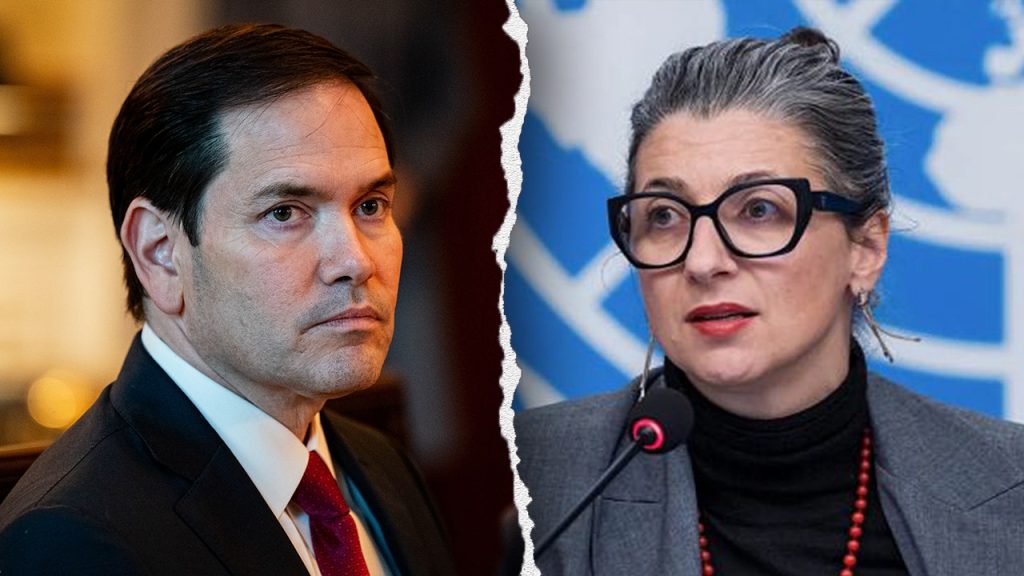On Wednesday, U.S. Secretary of State Marco Rubio announced a significant policy shift by imposing sanctions on Francesca Albanese, the United Nations Special Rapporteur on Palestinian rights. This move reflects a broader realignment in U.S. foreign policy and a response to Albanese’s outspoken criticisms of Israel and the United States, which have drawn considerable political backlash. Officials indicate that the decision underscores the U.S. commitment to its allies and its stance on matters concerning international human rights.
| Article Subheadings |
|---|
| 1) Background on Francesca Albanese |
| 2) The Nature of the Sanctions |
| 3) Reactions from Officials and Leaders |
| 4) Controversies Surrounding Albanese’s Mandate |
| 5) Implications for U.S. Foreign Policy |
Background on Francesca Albanese
Francesca Albanese has held her position as the UN Special Rapporteur on Palestinian rights since her appointment in 2022. She has utilized her platform to advocate for Palestinian rights, often making provocative claims against Israel’s policies. Her statements have included accusations of apartheid against Israel and assertions that U.S. involvement in the region contributes significantly to ongoing conflicts. Albanese’s perspectives, which align closely with various human rights organizations, have garnered mixed reactions globally. Critics argue that her reports lack balance and inadvertently perpetuate anti-Semitic rhetoric, while supporters praise her for shedding light on Palestinian struggles.
The Nature of the Sanctions
The sanctions announced by Secretary Rubio aim to curb Albanese’s influence and address what the U.S. government considers her harmful rhetoric against both Israel and the American administration. Rubio stated, “Albanese’s campaign of political and economic warfare against the United States and Israel will no longer be tolerated.” This statement aligns with a broader push by U.S. officials to re-evaluate relationships with international figures advocating viewpoints that conflict with American foreign policy. The specifics of the sanctions include travel restrictions and potential financial penalties, although detailed measures have not been publicly disclosed. The rationale for these sanctions rests on concerns that her actions compromise U.S. interests and security in the region.
Reactions from Officials and Leaders
The announcement of sanctions has elicited strong reactions from both American and Israeli officials. Anne Bayefsky, President of Human Rights Voices, praised the sanctions, saying they marked a significant stand against what she terms “virulent” anti-Semitism and continuous attacks on U.S. sovereignty. *”Albanese poses a direct threat to the well-being and security of U.S. citizens,”* she declared. Conversely, Israeli leaders, including Foreign Minister Gideon Sa’ar, echoed similar sentiments, emphasizing that the measures send a clear message to the UN about the consequences of ignoring close U.S.-Israel ties. Hillel Neuer, Executive Director of UN Watch, also commended the move as unprecedented and crucial in combating perceived malign influence within international circles.
Controversies Surrounding Albanese’s Mandate
Albanese’s tenure has not been without controversy. Critics have labeled her comments as dangerously biased, particularly her suggestion that companies aiding Israel’s defense capabilities should face legal ramifications. Furthermore, her questioning of whether “the Jewish lobby” controls U.S. foreign policy raised significant concerns about her commitment to objectivity, leading to accusations of anti-Semitism, a claim she later retracted. These statements have intensified calls for her removal from the UN’s oversight, with many arguing that they undermine the credibility of the organization. Albanese’s path has been marked by vehement disputes over her mandate, which many believe overreaches the initial intent of her role.
Implications for U.S. Foreign Policy
The imposition of sanctions on Albanese signals a decisive shift in U.S. foreign policy, particularly regarding the Israeli-Palestinian conflict. By taking a firm stand against individuals perceived as undermining U.S. interests, the administration appears committed to reinforcing its bilateral relationships especially with Israel. This policy shift could potentially embolden similar actions aimed at critics of U.S. foreign diplomacy in other regions. While the sanctions explicitly target Albanese, they reflect broader U.S. efforts to recalibrate its global stance, particularly on human rights and international governance. Analysts speculate that this could lead to increased tensions within international organizations like the UN, further complicating U.S. efforts to engage diplomatically in contentious areas such as the Middle East.
| No. | Key Points |
|---|---|
| 1 | Secretary of State Marco Rubio announced sanctions against Francesca Albanese. |
| 2 | The sanctions reflect growing tensions between the U.S. and certain UN officials. |
| 3 | Albanese’s controversial statements have prompted significant backlash. |
| 4 | Reactions from Israeli officials indicate strong support for U.S. sanctions. |
| 5 | The implications extend to U.S. foreign policy and its approach to international institutions. |
Summary
The sanctions imposed on Francesca Albanese by Secretary of State Marco Rubio represent a clear shift in U.S. policy concerning the Israeli-Palestinian conflict and international human rights advocacy. With bipartisan support for these measures, it demonstrates a commitment to uphold U.S. foreign policy interests while addressing concerns regarding anti-Semitism and harmful rhetoric in global dialogues. As tensions continue to rise within international organizations, the repercussions of this action for U.S. relations, particularly with Israel, will be closely monitored.
Frequently Asked Questions
Question: What sanctions have been imposed on Francesca Albanese?
The sanctions include travel restrictions and potential financial measures, aimed at restricting her influence and addressing her controversial statements regarding Israel and the U.S.
Question: Why has Francesca Albanese attracted controversy?
Albanese has been criticized for her statements labeling Israel’s policies as apartheid and for comments perceived as anti-Semitic, which have sparked significant debates about her role as a UN official.
Question: What are the broader implications of these sanctions for U.S. foreign policy?
The sanctions signal a more assertive U.S. stance toward international figures who critics view as undermining American interests, particularly in the context of Israeli-Palestinian relations and may lead to increased tensions within international organizations like the UN.


